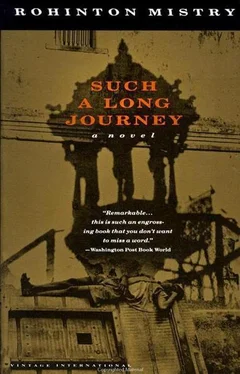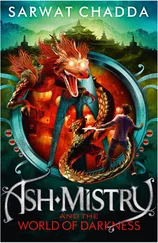These sordid footpaths provided one reason why Gustad hated coming to Dr. Paymaster. But with the failure of subjo, Entero-Vioform, and Sulpha-Guanidine, he had no choice.
Over the years, as the neighbourhood underwent its peculiar transmogrification, only four establishments were able to resist change and endure. The nature of their businesses satisfied needs too deep to be displaced by builders, speculators, or government planners.
The first two were cinema houses, located at the crossroads not far from the beach. Despite their proximity, the proprietors enjoyed peaceful coexistence because the supply could never satiate the voracious demand. When a new film arrived, it roused the neighbourhood and awakened an industry that was seldom fast asleep. Black-marketeers and scalpers began buzzing around the theatres, bombinating ceaselessly, very like the mosquito clouds that rose from Khodadad Building’s urine-soaked wall, droning tunefully: ‘Ten-for-five, ten-for-five, ten-for-five…’ Price ratios could keep soaring, depending on the stars and number of songs on the soundtrack. The black-market usually slowed after the first mad rush, then lay dormant like larvae waiting to hatch with the next celluloid release.
By and by, one of the cinemas decided to renovate, in keeping with the neighbourhood’s and the country’s aspirations, and the other had no choice but to follow suit. After the work was completed, both cinemas announced on the same day, with full-page newspaper advertisements, the first movie theatre in the country with 70mm capability, Todd-AO and Six-Track Sound. Soon, people were thrilling in their plusher, softer seats to the wide-screen spectacle, where the hero and heroine loomed like giants, where the massive trees round which they danced and sang grew ever taller, and where the black-hearted villain’s evil dagger was bigger and sharper, and glinted more wickedly than was ever thought possible for a dagger to glint. Audiences emerged in awe, their confidence renewed that nothing could now stand in the way of the country’s progress and modernization.
The first film to be shown after the renovations was an epic of kings and warriors, and Gustad had taken his family to see it. This was before Roshan was born, when Darius was three and Sohrab seven. For close to four hours, the kings and warriors spoke in thunderous voices, while gallant steeds and shining armour clashed with deafening clangour. Cudgels bashed, swords slashed, cymbals crashed. Maces bristling with ferocious spikes landed and shields were dented. At suitable intervals, hordes of women descended upon the battlefield, and the warriors and kings ceased their military pursuits: in bloodstained, battered armour, they sang and danced with their womenfolk. But the musical encounters seemed as terrifying as the battle scenes, and soon, Sohrab was shrieking in terror while Darius sobbed, though neither would turn away his eyes. Dilnavaz had to force them to put their faces in her lap, where they eventually fell asleep.
While the years went by to the rolling thunder of film reels, there was a third establishment nearby that did not alter its basic business. It was the oldest house in the locality. A skeleton staff was ready all day to provide service, but after six o’clock the cages filled up with painted women in saris wrapped impossibly low over their bellies, in blouses skimpier than brassières, or in little-girl frocks, fingers holding the cigarette of the wanton. Strands of fragrant jasmine and chamayli hung in their hair, bangles tinkled on their wrists, and the soft chhum-chhum of anklets could be heard when they moved. Scented oils and perfumes from Bhindi Bazaar — extracts and attars that enveloped them in dense, erotic clouds — filled the evening air and cloyed the senses of passers-by.
The House of Cages offered a full range of services, from the brisk, no-nonsense handjob even the poorest of day labourers could afford, to the most intricate contortions from a standard Kama-Sutra or The Perfumed Garden: something to suit the tume-scence of every customer and wallet. The locals dreamed about soft scented sheets, air-conditioned rooms, hot and cold drinks, dancing-girls, various exotic liquors, food fit for a king from the brothel’s delectable kitchen, and aphrodisiacs like the notorious palung-tode —bed-breaker— paan. The House of Cages catered for every one of these luxuries, with the exception of the last. Paan had to be purchased from the stall outside.
The stall outside was the domain of Peerbhoy Paanwalla, the grizzled old man whose lips were perpetually reddened, doubtless from sampling his own wares. Rain or shine, he wore nothing more than a loongi. His wrinkled, old-woman dugs hung over a loose-skinned belly equipped with a splendid, ageless navel that watched the street tirelessly, an unblinking, all-seeing third eye. Sitting cross-legged on his wooden box, he seemed more swami or guru than paanwalla, his high forehead furrowed with creases bespeaking ancient wisdom, his large authoritative nose flaring brahminically as he dispensed slices of sagacity in direct discourse or wrapped between betel leaves.
Like an artisan of antiquity, Peerbhoy took great pride in his products. Besides the notorious bed-breaker paan, he sold various others: to ward off sleep, to promote rest, to create appetites, to rein in an excess of lust, to help digestion, to assist bowel movements, to purify the kidneys, to nullify flatulence, to cure bad breath, to create seductive breath, to fight failing eyesight, to make well the deaf ear, to encourage lucidity of thought, to improve speech, to alleviate the stiffness of joints, to induce longevity, to reduce life expectancy, to mitigate the labour of birthing, to ease the pain of dying — in short, he had a paan for all seasons. But among neophytes, tense because it was their first time, or first in a brothel, the one most in demand was the bed-breaker.
When they gathered, drawn by the large brass tray Peerbhoy rang like a gong, he soothed their anxieties with aphrodisiacal anecdotes. Palung-tode paan, he would say, as he chose a betel leaf, snipped off its stem, and began mixing chopped betel nuts, chunam, and tobacco — the palung-tode, he would say, had a long and honourable history, popular with Hindu rajas and Mogul emperors alike. In the old days, when it was time for the annual procession in which the raja had to walk naked before the public with erect phallus, to convince his subjects that the right to be ruler still belonged to him, it was the palung-tode he relied on. The secret was told to a few courtiers only, who, each year after the ceremony, were executed to guard the deception.
Mogul emperors also used palung-tode, said Peerbhoy, but in a less pedestrian way: when they wanted to service their harems. Though even here, reasons of state intruded, because the emperor’s sexual prowess was invariably linked to his popularity, and, for his enemies, was a reliable indicator of how deeply he had penetrated the hearts and minds of his subjects. Coups and palace plots were inevitably on the rise when word came from the zanaan-khana that the emperor was flagging.
All this, no matter how true or false, said Peerbhoy Paanwalla (as he extricated herbs from unmarked jars and added mysterious powders from dented metal cans) — all this was a long time ago, and now has become history or fable. But not so long ago, a man calling himself Shri Lokhundi Lund, Mister Iron Cock, had arrived and, flashing his money, ordered the most expensive, undiluted palung-tode, determined to take unfair advantage of the House policy: satisfaction guaranteed. He paid (in the old days, it was cash in advance) and made his choice.
Читать дальше












